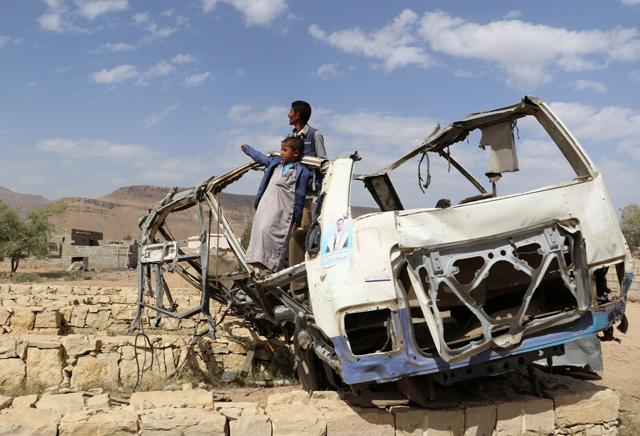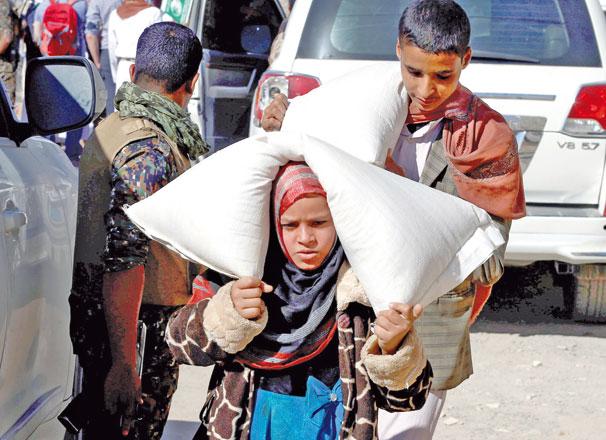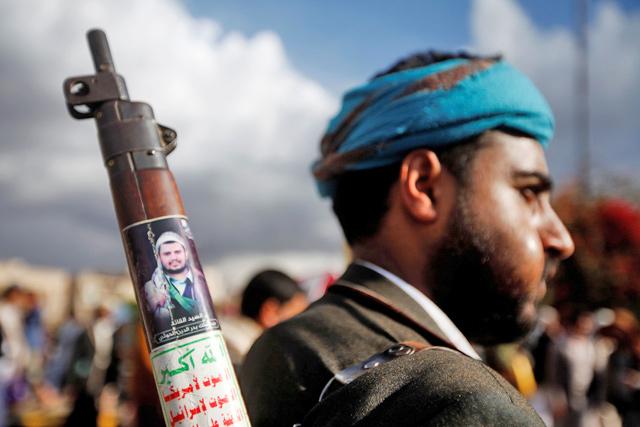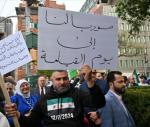You are here
Key players in Yemen conflict
By AFP - Sep 06,2018 - Last updated at Sep 06,2018

Abdullah Al Khawlani stands on Thursday with his son, Hafidh, who survived a Saudi-led air strike stand on the wreckage of a bus destroyed by the strike in Saada, Yemen (Reuters photo)
SANAA — Yemen's war pits a disparate camp of government loyalists and southern separatists backed by a Saudi-led coalition against Iran-allied rebels.
More than 10,000 people have been killed in the conflict since March 2015,.
Here are some of the key players:
Houthi rebels
Known as Ansarullah (Supporters of God), the Zaidis are an offshoot of Shiite Islam and make up a third of Yemen's population, which is mainly Sunni Muslim.
Their strongholds lie in northern provinces, and over the past year they have launched multiple ballistic missiles against neighbouring Saudi Arabia, which leads the coalition against them.
The rebels fought six wars with the central government between 2004 and 2010, killing thousands.
Badreddin Al Houthi, who formed the "Faithful Youth" political movement in 1992 to fight discrimination, is regarded as their spiritual leader.
His son, current Houthi chief Abdulmalik Al Houthi, would, however, later ally with arch-foe Ali Abdullah Saleh, Yemen's former president who was gunned down by the Houthis in December 2017.
The Houthis seized Sanaa on September 21, 2014 with the help of Saleh and army units loyal to him.
In March 2015, they advanced on second city Aden, where Saleh's successor, President Abed Rabbo Mansour Hadi, took refuge.
The Saudi-led coalition helped pro-Hadi forces push the rebels out of the southern port of Aden in July that year, as well as from four other provinces.
Houthis are accused of receiving missiles from Iran. Tehran denies.
Saleh assassinated
Once foes, the Houthis and Saleh formed an uneasy alliance that lasted some three years. But in 2017 it collapsed into violent clashes between the two camps in Sanaa.
The Houthis accused the veteran strongman of "high treason" after Saleh made overtures to the Saudi-led coalition.
Saleh, who dominated Yemen unchallenged for three decades, was shot dead by Houthi fighters on December 4, 2017 as he tried to flee Sanaa.
Hadi government
Struggling to survive politically as the Houthis gained power, President Hadi — formerly second-in-command to Saleh — has been largely dependent on his allies in a regional coalition led by Saudi Arabia.
The Saudi-led alliance intervened in the Yemen war in 2015, bolstering Hadi's military standing.
The Saudi-backed counter-offensive helped the army retake key provinces in southern Yemen and eventually the strategic Bab Al Mandeb Strait.
In 2017, the government alliance launched an operation to retake a string of rebel-held ports on the Red Sea coastline, including Hodeida — still under Houthi control.
Yemen's Southern Transitional Council, which calls for the reinstatement of southern Yemen as an independent entity, is technically allied with the Hadi government.
But in January 2018, southern separatist forces linked to the council clashed with Hadi's troops, dealing a blow to the president's political standing in the south.
Saudi Arabia, UAE
The Saudi-led coalition that intervened in support of Hadi in March 2015 has deployed ground troops and conducted bombing campaigns that have helped the loyalists regain some terrain.
The United Arab Emirates (UAE) plays a key role in the coalition, backing an ongoing offensive along the Red Sea coast alongside Saudi Arabia.
The UAE also backs the southern separatists who launched an attempted takeover of the southern province of Aden in January.
The following month, Saudi and Emirati envoys shuttled between Yemen's government and southern separatists in a bid to end the deadlock.
Extremists
Al Qaeda in the Arabian Peninsula (AQAP) is classified by the United States as the extremist network's deadliest branch.
It was formed in 2009 when Al Qaeda in Yemen — behind the 2000 bombing of the USS Cole in Aden harbour that killed 17 American sailors — merged with its Saudi counterpart.
AQAP has attacked both government security forces and the Houthis, and has itself been targeted by scores of US drone strikes.
The United States has intensified its air attacks on AQAP since President Donald Trump took office in January with drone strikes regularly reported by Yemeni military sources.
Daesh first surfaced in Yemen in March 2015, claiming multiple suicide bombings targeting two mosques in Sanaa attended by Houthis, killing 142 people and wounding more than 350.
It has since expanded in the south, launching more deadly suicide bombings.
Related Articles
ADEN — Yemen's internationally-recognized government said on Saturday it had banned public gatherings in Aden ahead of a deadline given by s
RIYADH — The Saudi-led coalition launched an air raid Saturday on a cave in the Yemeni capital Sanaa, used by Houthi rebels to stockpile dro
SANAA — Yemen's exiled president sacked the head of the central bank on Sunday and ordered it relocated to the southern city of Aden, a move

















